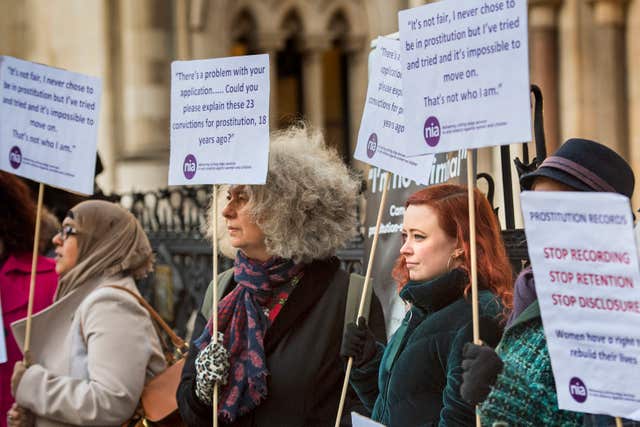
Three women who say they were “groomed, pimped and trafficked” into sex work have launched a legal challenge against the Government.
Fiona Broadfoot and two other women, who cannot be named, are fighting a case at the High Court in London in a bid to prevent their criminal record being revealed to potential employers.
The court heard all three women were forced into sex work as teenagers and each have multiple convictions for soliciting or loitering under the Street Offences Act.
A group of demonstrators gathered outside the court before the hearing on Wednesday.
Protesters gathering outside the Royal Courts of Justice today to show support for today’s hearing on criminal records from prostitution pic.twitter.com/Q8wNLFbWGE
— Centre for Women's Justice (@centreWJ) January 17, 2018
Lawyers for the women argued, as victims of exploitation and trafficking, they should not be forced to reveal their past convictions.
Karon Monaghan QC, for the women, argued the current policy and the “criminalisation” of their past conduct breached their rights, enshrined in the European Convention on Human Rights, to privacy and freedom from forced labour.
She also said it infringed their right to freedom from gender discrimination, as the offence was “overwhelmingly likely to be committed by women”.
In written submissions, she told the court: “The soliciting or loitering convictions have had serious consequences on the lives and employment opportunities of the claimants and on others in a similar situation.
“Although they are not statutorily barred from working with children or vulnerable adults, because of the scheme under challenge they are required to disclose their convictions whenever they seek employment or wish to volunteer in certain sectors.”
She added: “The sexual exploitation of children is and was at material times unlawful, as is and was causing or inciting an adult individual to become a prostitute or controlling the activities of a prostitute.
“The claimants were victims of these offences and they were criminalised in respect of the very conduct that made them victims.”

Kate Gallafent QC, representing the Secretaries of State for Justice and the Home Department, argued the claim should be dismissed.
She said the decision of Parliament to include the offence in its criminal records disclosure scheme was “legitimate” and the recording of convictions was a “justified” interference with privacy rights.
She also argued there was no gender discrimination involved, adding: “There is no difference in treatment between the female claimants and a relevant male comparator, whose criminal records would be treated in exactly the same way.”
The case, being heard by Mr Justice Holroyde and Mrs Justice Nicola Davies, continues on Thursday.


Comments: Our rules
We want our comments to be a lively and valuable part of our community - a place where readers can debate and engage with the most important local issues. The ability to comment on our stories is a privilege, not a right, however, and that privilege may be withdrawn if it is abused or misused.
Please report any comments that break our rules.
Read the rules hereComments are closed on this article